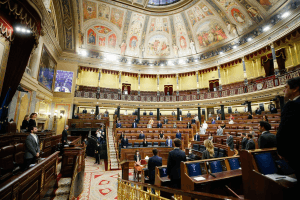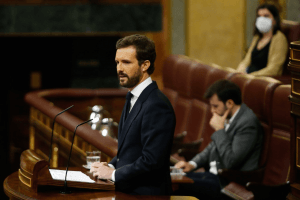The Spanish Congress has voted to extend the current ‘state of alarm’ in Spain for a final time until 21 June. There were 177 votes in favour, 155 against, and 18 abstentions.
The PSOE-Podemos coalition government led by Pedro Sánchez secured the vote with the support of Ciudadanos (Cs) and the Basque Nationalist Party (PNV). The government also had support from the minor parties: Coalición Canaria, Nueva Canarias, Partido Regionalista de Cantabria, Teruel Existe and Más País.
The Catalan pro-independence Esquerra Republicana (ERC) party abstained.
The right-wing People’s Party (PP), far-right Vox, and the Catalan pro-independence Junts per Catalunya (JxCat) and CUP parties all voted against the extension.
It is the sixth time that the ‘state of alarm’ has been extended – and it will now remain in place to see out the end of the country’s lockdown restrictions being lifted through the government’s four-phase de-escalation plan. That plan commenced on 4 May and will continue until towards the end of June, when the country hopes to return to a ‘new normality’.

ALSO READ: Coronavirus in Spain (3 June)
Last Sunday Spanish Prime Minister Pedro Sánchez announced that this final extension would be ‘different’ and ‘lighter’ than previous times.
Sánchez said that the regional governments of Spain would regain all their powers to control the de-escalation process from Monday 8 June, the date at which many areas should be in Phase Three – although the central Spanish government would still control travel between different regions.
He had also announced that after 21 June, once the final extension to the ‘state of alarm’ has been concluded, citizens would start to have freedom of movement across the whole country, provided there is not a new increase of Coronavirus infections.
ALSO READ: Spain prepares for national and international tourists … but will they come?
Sánchez, leader of the socialist PSOE party, leads a coalition government with the left-wing Podemos group.
Together they have 155 seats in the 350-seat chamber (120 PSOE and 35 Podemos).

Each extension of the ‘state of alarm’ has required a vote in the Spanish Congress and just a simple majority – more yes votes than no votes.
On 20 May, when the Spanish Congress had voted for a fifth time to extend the ‘state of alarm’ until 7 June, there had been 177 votes in favour, 162 against, and 11 abstentions.
The vote had succeeded with the support of Ciudadanos (Cs) and the Basque Nationalist Party (EAJ-PNV), as well as the Coalición Canaria.
At the time Sánchez had originally wanted to extend it for a whole month, until later in June. Each time the ‘state of alarm’ had been extended previously, it had been for two weeks at a time. For the 20 May vote, Sánchez changed the plan from a month to a two week extension in order to secure the support of the Ciudadanos (Cs) party, led by Inés Arrimadas.

ALSO READ: Lifting of lockdown in Spain – full details of all phases for all regions.
Throughout the Coronavirus pandemic the Spanish government has received fierce criticism from the opposition for the prolonged ‘state of alarm’ in the country – with Pablo Casado, leader of the right-wing People’s Party (PP), accusing Sánchez of overstepping his powers as prime minister.
We are currently updating this report.
‘State of Alarm’ & lockdown in Spain to date
On 20 May the Spanish Congress voted for a fifth time to extend the ‘state of alarm’ in Spain until 7 June. There were 177 votes in favour, 162 against, and 11 abstentions.
For the previous vote in Congress on 6 May, the PSOE-Podemos coalition government of Sánchez also had to rely on last minute deals with the Ciudadanos (Cs) party and the Basque Nationalist Party (EAJ-PNV) to secure the fourth extension.
Votes in favour of the extension that time were 178, with 75 voting against, and with 97 abstentions. The right-wing People’s Party (PP) abstained in the vote. The Catalan pro-independence parties and the far-right Vox party had voted against.
When the Spanish Congress had voted on 22 April to extend the ‘state of alarm’ until 9 May, however, there had been 269 votes in favour, 60 against, with 16 abstentions.
Previous voting on 9 April to extend the ‘state of alarm’ until 26 April had resulted in 270 votes in favour, 54 against, with 25 abstentions.
Spain originally commenced its lockdown for two weeks from 14 March, with measures that confined everyone to their homes apart from leaving to purchase food or medication, or to go to their place of work only if they could not perform their duties from home. After one week, these initial measures were then extended until 12 April, for a second time until 26 April, a third time until 9 May, a fourth time until 23 May, then a fifth time until 7 June. It has now been extended for a sixth and final time until 21 June.
During the overall lockdown period, from Monday 30 March until after Easter, further measures were introduced ordering all non-essential workers in Spain to also remain at home. Following the Easter break, industrial and construction workers, as well as non-essential employees in sectors where working from home wasn’t possible, started a gradual return to work.
When the Spanish Congress had voted to extend the ‘state of alarm’ until 9 May, it also came with the relaxation of some restrictions, specifically allowing children aged up to 14 the opportunity to take daily walks for an hour from Sunday 26 April, after 43 days confined at home.
From Saturday 2 May – after 48 days in confinement – adults across Spain also were allowed out to walk and exercise during set time slots.
The four-phase de-escalation plan then officially commenced from Monday 4 May.
Please support Spain in English with a donation
Our previous reports on Coronavirus in Spain:
ALSO READ: Coronavirus in Spain (3 June)
ALSO READ: Lifting of lockdown in Spain – full details of all phases for all regions.
ALSO READ: Coronavirus in Spain figures (2 June)
ALSO READ: Coronavirus in Spain figures (31 May)
ALSO READ: Spain’s ‘excess mortality’ during Coronavirus pandemic is over 43,000
ALSO READ: Barcelona enjoys Phase One, with parts of Catalonia in Phase Two.
ALSO READ: Far-right Vox party organise car protest
ALSO READ: Spanish Congress votes to extend ‘state of alarm’ until 7 June
ALSO READ: Face masks to be compulsory in closed spaces and outside, if not at 2-metre distance
ALSO READ: Spain extends international ban on entry into country until 15 June
ALSO READ: Ryanair plans to restore 40% of flights from 1 July
